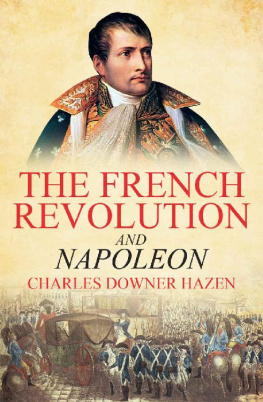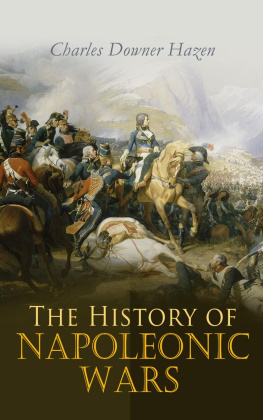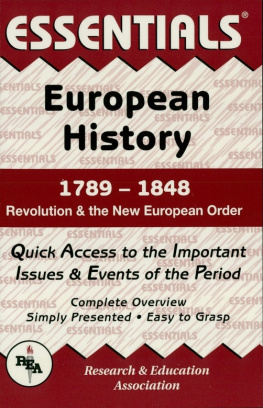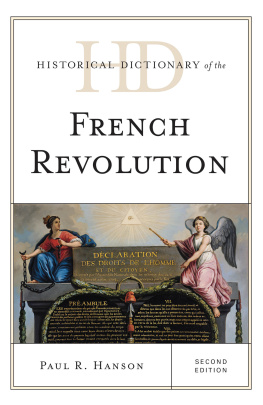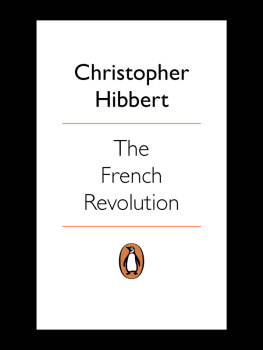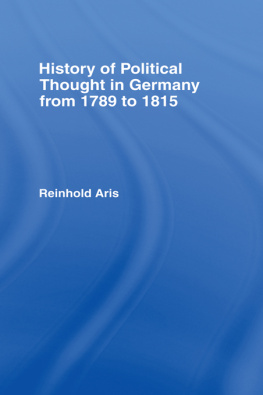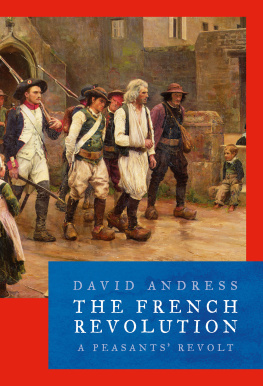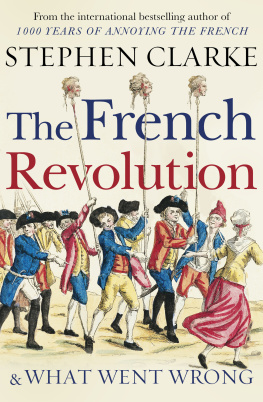THE FRENCH REVOLUTION AND NAPOLEON
CHARLES DOWNER HAZEN
First published by Henry Holt and Company in 1917.
This edition published in 2017.
TABLE OF CONTENTS
PREFACE
No historian believes that history repeats itself. Yet, between different ages there are frequently striking analogies and resemblances. It is problems that repeat themselves, not the conditions which determine their solution. One of these problems, recurrent in European annals, is that of the maintenance of a certain balance of power among the various nations as essential to their freedom, the maintenance of a situation to which they are accustomed and which they have found tolerable, a change in which would be prejudicial or dangerous to their peace and safety. Several times in modern history this balance has been threatened and Europe has purchased immunity from servitude by freely giving its life blood that life might remain and might be worth living.
To an age like our own, caught in the grip of a world war, whose issues, however incalculable, will inevitably be profound, there is much instruction to be gained from the study of a similar crisis in the destinies of humanity a century ago. The most dramatic and most impressive chapter of modern history was written by the French Revolution and by Napoleon. And between that period and our own not only are there points of interesting and suggestive comparison but there is also a distinct line of causation connecting the two.
For the convenience of those who may wish to review this memorable and instructive period I have brought together in this volume the chapters dealing with it in my Modern European History. In the opening twentieth century, as in the opening nineteenth, mankind has been driven to the ordeal by battle by the resolve to preserve the most cherished things of life. Now, as then, civilization hangs upon the arbitrament of the sword. It is not churches alone that owe their existence and their power to the blood of the martyrs. The most precious rights of nations and of individuals have not only been achieved, but have been maintained inviolate, by the unconquerable spirit of the brave.
Great is the glory, for the strife is hard!
C. D. H.
January 10, 1917.
INTRODUCTION: THE OLD REGIME IN EUROPE
ANYONE who seeks to understand the stirring period in which we are now living becomes quickly aware that he must first know the history of the French Revolution, a movement that inaugurated a new era, not only for France but for the world. The years from 1789 to 1815, the years of the Revolution and of Napoleon, effected one of the greatest and most difficult transitions of which history bears record, and to gain any proper sense of its significance one must have some glimpse of the background, some conception of what Europe was like in 1789. That background can only be sketched here in a few broad strokes, far from adequate to a satisfactory appreciation, but at least indicating the point of departure.
What was Europe in 1789? One thing, at least, it was not: it was not a unity. There were states of every size and shape and with every form of government. The States of the Church were theocratic; capricious and cruel despotism prevailed in Turkey; absolute monarchy in Russia, Austria, France, Prussia; constitutional monarchy in England; while there were various kinds of so-called republics federal republics in Holland and Switzerland, a republic whose head was an elective king in Poland, aristocratic republics in Venice and Genoa and in the free cities of the Holy Roman Empire.
Of these states the one that was to be the most persistent enemy of France and of French ideas throughout the period we are about to describe was England, a commercial and colonial empire of the first importance. This empire, of long, slow growth, had passed through many highly significant experiences during the eighteenth century. Indeed, that century is one of the most momentous in English history, rendered forever memorable by three great series of events which in important respects transformed her national life and her international relations, giving them the character and tendency which have been theirs ever since. These three streams of tendency or lines of evolution out of which the modern power of Britain has emerged were: the acquisition of what are still the most valuable parts of her colonial empire, Canada and India; the establishment of the parliamentary system of government, that is, government of the nation by its representatives, not by its royal house, the undoubted supremacy of Parliament over the Crown; and the beginnings of what is called the Industrial Revolution, that is, of the modern factory system of production on a vast scale which during the course of the nineteenth century made England easily the chief industrial nation of the world.
The evolution of the parliamentary system of government had, of course, been long in progress but was immensely furthered by the advent in 1714 of a new royal dynasty, the House of Hanover, still at this hour the reigning family. The struggle between Crown and Parliament, which had been long proceeding and had become tense and violent in the seventeenth century in connection with the attempts of the Stuart kings to make the monarchy all-powerful and supreme, ended finally in the eighteenth century with the victory of Parliament, and the monarch ceased to be, what he remained in the rest of Europe, the dominant element in the state.
In 1701 Parliament, by mere legislative act, altered the line of succession by passing over the direct, legitimate claimant because he was a Catholic, and by calling to the throne George, Elector of Hanover, because he was a Protestant. Thus the older branch of the royal family was set aside and a younger or collateral branch was put in its place. This was a plain defiance of the ordinary rules of descent which generally underlie the monarchical system everywhere. It showed that the will of Parliament was superior to the monarchical principle, that, in a way, the monarchy was elective. Still other important consequences followed from this act.
George I, at the time of his accession to the English throne in 1714 fifty-four years of age, was a German. He continued to be a German prince, more concerned with his electorate of Hanover than with his new kingdom. He did not understand a word of English, and as his ministers were similarly ignorant of German, he was compelled to resort to a dubious Latin when he wished to communicate with them. He was king from 1714 to 1727, and was followed by his son, George II, who ruled from 1727 to 1760 and who, though he knew English, spoke it badly and was far more interested in his petty German principality than in imperial Britain.
The first two Georges, whose chief interest in England was the money they could get out of it, therefore allowed their ministers to carry on the government and they did not even attend the meetings of the ministers where questions of policy were decided. For forty-six years this royal abstention continued. The result was the establishment of a regime never seen before in any country. The royal power was no longer exercised by the king, but was exercised by his ministers, who, moreover, were members of Parliament. In other words, to use a phrase that has become famous, the king reigns but does not govern. Parliament really governs, through a committee of its members, the ministers.
The ministers must have the support of the majority party in Parliament, and during all this period they, as a matter of fact, relied upon the party of the Whigs. It had been the Whigs who had carried through the revolution of 1688 and who were committed to the principle of the limitation of the royal power in favor of the sovereignty of Parliament. As George I and George II owed their throne to this party, and as the adherents of the other great party, the Tories, were long supposed to be supporters of the discarded Stuarts, England entered upon a period of Whig rule, which steadily undermined the authority of the monarch. The Hanoverian kings owed their position as kings to the Whigs. They paid for their right to reign by the abandonment of the powers that had hitherto inhered in the monarch.
Next page
